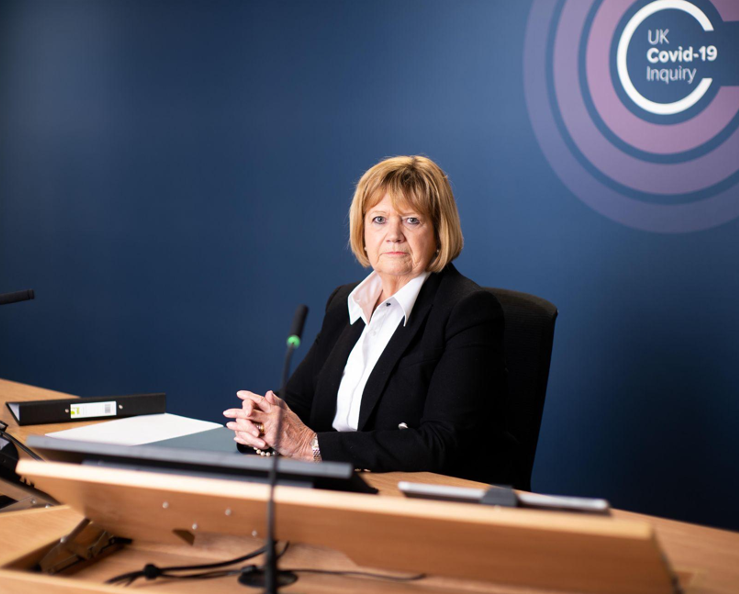The Chair of the UK Covid-19 Inquiry, Baroness Hallett, has today opened Module 10 ‘Impact on society’, the final investigation of the UK Covid-19 Inquiry.
It will examine the impact of Covid-19 on the population of the United Kingdom with a particular focus on the experiences of key workers, the most vulnerable and those bereaved during the pandemic.
Module 10 will also investigate the impact of the measures put in place to combat the disease and any disproportionate impact on certain groups.
The investigation will also seek to identify where societal strengths, resilience and or innovation reduced any adverse impacts.
The pandemic affected everyone, but some far more than others and it is important we question why some were disproportionately affected.
That is why Module 10 ‘Impact on society’, our final investigation, will look at how certain decisions - from restrictions on funerals, the implementation of workplace safety measures to the closures of places of worship, hospitality and retail settings - affected specific groups of people and the general population of the United Kingdom.
It is important that we investigate and understand this impact to reduce the likelihood of people suffering in the same way in the future.
Module 10 will examine the impact of the pandemic and the measures put in place on the following groups:
- The general population of the UK including the impact on mental health and wellbeing of the population. This will include the community level impact on:
- sport and leisure and cultural institutions
- the closure and reopening of and restrictions imposed on the hospitality, retail, travel and tourism industries
- restrictions on worship
- Key workers, excluding health and social care workers, but including those working in the police service, fire and rescue workers, teachers, cleaners, transport workers, taxi and delivery drivers, funeral workers, security guards and public facing sales and retail workers. It will cover:
- the impact of implementing government decisions
- any inequality in the impact of interventions, including lockdown, testing and workplace safety
- any inequality in the impact on health outcomes, such as infections, mortality and mental and physical wellbeing.
- The most vulnerable, including those outlined in the Inquiry’s Equalities Statement and the clinically vulnerable and clinically extremely vulnerable. It will include the following topics:
- housing and homelessness
- safeguarding and support for victims of domestic abuse
- those within the immigration and asylum system
- those within prisons and other places of detention
- those affected by the operation of the justice system.
- The bereaved, including restrictions on arrangements for funeral and burials and post-bereavement support.
More details of the areas of investigation are included in the provisional scope for Module 10.
The Core Participant application window will be open from Tuesday 17 September to Tuesday 15 October. Due to the wide range of issues being investigated, the Chair is minded to designate only Core Participant applicants who can speak to a range of industries and/or parts of society significantly affected and are representative of the whole of the United Kingdom.
Organisations do not need to be designated core participants to be able to contribute to the module. They can provide evidence of their experience in other ways, such as through witness statements or through Every Story Matters. Approximately 45,000 people have so far shared their personal stories with Every Story Matters, the largest public engagement exercise ever undertaken by a UK public inquiry.
Earlier this month, the Inquiry published its first Every Story Matters record to coincide with the start of Module 3 public hearings. Every story shared will be valuable in shaping the Inquiry’s recommendations and help us to learn lessons for the future.
A full list of the topics that the Inquiry will investigate can be found in our Terms of Reference.
The Chair continues to aim to end public hearings in 2026. The current schedule of hearings is as follows:
| Module | Opened on… | Investigating… | Dates |
|---|---|---|---|
| 3 | 8 November 2022 | The impact of the pandemic on healthcare systems | Monday 9 September – Thursday 10 October 2024 Break: Monday 14 October – Friday 25 October 2024 Monday 28 October – Thursday 28 November 2024 |
| 4 | 5 June 2023 | Vaccines, therapeutics and anti-viral treatment across the UK | Tuesday 14 January – Thursday 30 January 2025 |
| 5 | 24 October 2023 | Procurement | Monday 3 March – Thursday 27 March 2025 |
| 7 | 19 March 2024 | Test, trace and isolate | Monday 12 May – Friday 30 May 2025 |
| 6 | 12 December 2023 | The care sector | Monday 30 June – Thursday 31 July 2025 |
| 8 | 21 May 2024 | Children and young people | Monday 29 September – Thursday 23 October 2025 |
| 9 | 9 July 2024 | Economic response | Winter 2025 |
| 10 | 17 September 2024 | Impact on society | Early 2026 |
